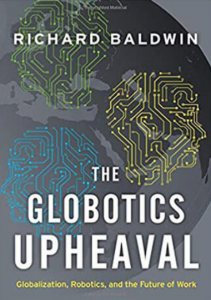
How to avoid the prospect of undermining the foundations of prosperity


What measures will governments and people take in response to such tectonic economic and cultural shift and how to avoid the prospect of undermining the very foundations of prosperity?
The US President’ strongest supporters live in the declining states. The UK’s Brexit backers are mostly from struggling regions, as in rich countries the divide that matters now is between the prosperous, educated city dwellers and those they obscured during decades of international economic integration.
Richard Baldwin’s The Globotics Upheaval gives a timely warning to the world’s business elite, who gathered this week for their annual party to the Swiss resort of Davos.
According to Baldwin, a trade economist at the Graduate Institute in Geneva, the globalisation with new kinds of robotics, from Artificial intelligence to technologies that make it easier to outsource services jobs. The accountants, doctors and lawyers will lose out as the competition from software robots and telemigrants will seem monstrously unfair. When the white collar workers start sharing the same pain a blue collar workers some sort of backlash is inevitable” Baldwin writes.
Machine learning will soon automate tasks traditionally performed by skilled professionals from assessing insurance claims to medical diagnosis, Translation software improved rapidly following breakthrough by Google, will breakdown final obstacle for foreign workers.
Virtual and augmented reality will arrive in workplaces too, in the vein of Microsoft’s experimental “holoportation” system which promises a future of Hollywood style hologram meetings.
Hundreds of millions of people in cities such as Bangalore, Hyderabad and Shenzhen could soon begin performing tasks once undertaken only in prosperous economies. India, with its sizeable English-speaking population and armies of techies could become hub for services outsourcing just as China was for manufacturing.
In equality could rise as new divides open between highly skilled elites and the rest. The once prosperous middle class who have tended to back economic openness will grow angry.
“ The urban educated people who voted against populism will have a whole new attitude when globalisation and automation get up close and personal” he writes.#
Political leader who failed to do much for struggling steel and car workers might suddenly prove responsive when faced with angry solicitors and management consultants. As America and Britain tear themselves apart over the legacy of the last wave of globalisation, the odds that they will be well prepared for the next one look pretty slim.
The Globotics Upheaval: Globalization, Robotics and the Future of Work by Richard Baldwin, Weidenfeld & Nicolson £20, 304 pages.
